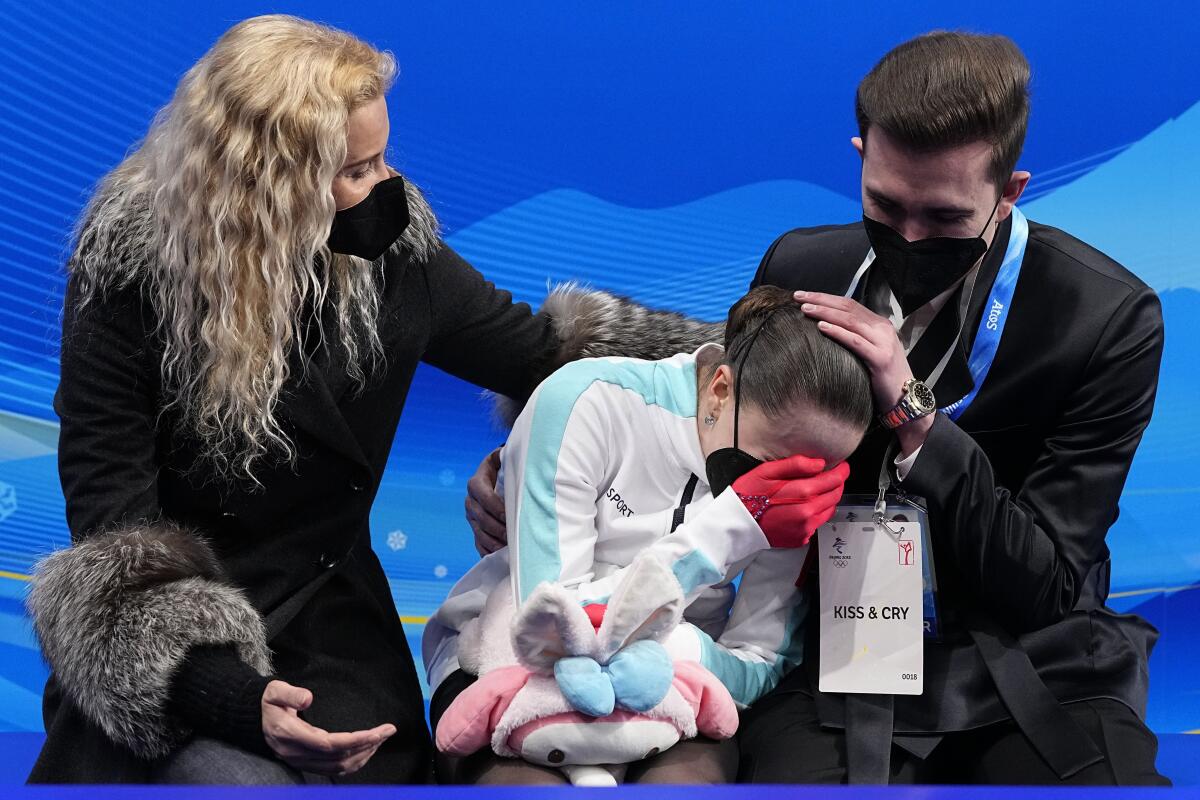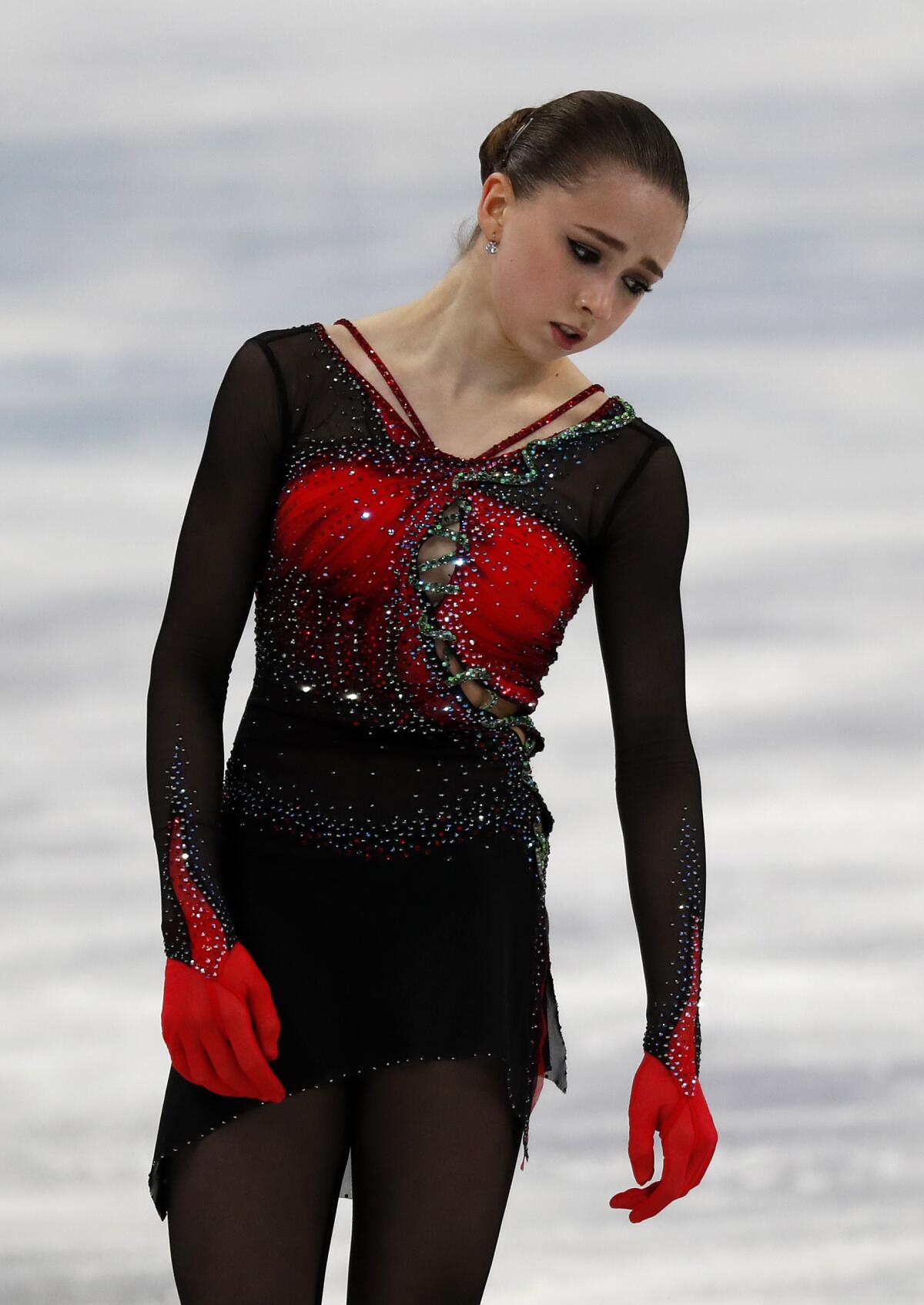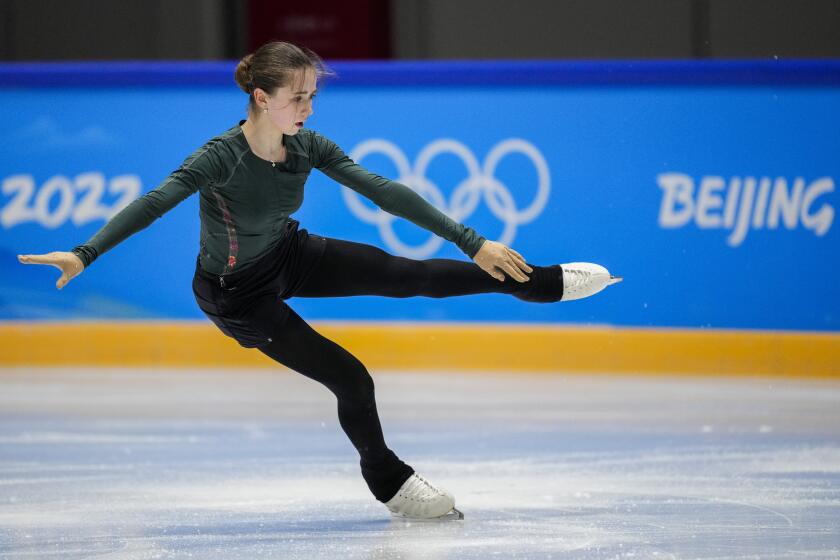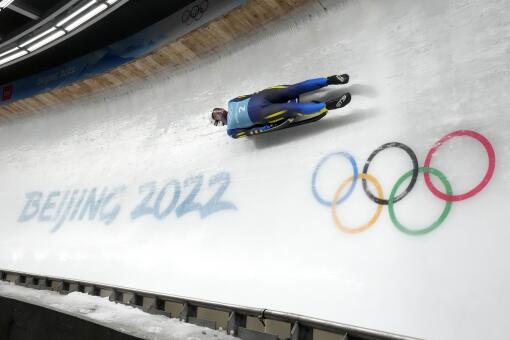Column: Treatment of Kamila Valieva shows why age limit for figure skaters should be raised

- Share via
BEIJING — On the morning after figure skating’s night of infamy, International Olympic Committee President Thomas Bach awoke to the deplorable way the adults who are supposed to look after 15-year-old Russian Kamila Valieva instead emotionally abused her.
It was startling to hear Bach say Friday that he was “very, very disturbed” to see Valieva’s meltdown in her free skate program Thursday and that he was disheartened by the “tremendous coldness” shown by her coach and support team, given that the IOC generally regards female athletes as little more than interchangeable performers whose purpose is to promote the Olympic brand. Valieva’s anguish was so raw, her entourage so callous that not even Bach could ignore it, and he tends to see rainbows and unicorns flitting around the Olympic rings while ignoring the cracks in the foundation.
Figure skating has a problem. It has many problems, actually. But what unfolded Thursday underscored the need for one of the glamour sports of the Winter Games to stop treating its athletes like disposable coffee cups and more like human beings who, at 15, often struggle to handle physical and emotional challenges. Figure skating’s beauty doesn’t have to be built on cruelty.
Kamila Valieva will be allowed to continue to compete at the Beijing Olympics despite failing a drug test before the Games started.
Valieva tested positive for a banned substance on Dec. 25 but the results, delayed by a Swedish laboratory that has said it was understaffed, weren’t sent to the Russian Anti-Doping Agency until after she led the Russian Olympic Committee to a gold medal in the team event. Her suspension was lifted after one day, a decision upheld by the Court of Arbitration for Sport in part because she is under 16 and considered a “protected person.”
She was heavily favored to win the singles gold medal and led the field after the short program, but she stumbled several times Thursday. After she exited the ice, her hard-driving coach, Eteri Tutberidze, was heard asking her, “Why did you let go?” in implying Valieva had lost focus after a misstep on her second jump, a triple axel. “Explain it to me, why. Why did you stop fighting? You let go after that axel. Why?”
In the meantime, Tutberidze ignored another student, Anna Shcherbakova, who won the gold medal. Silver medalist Alexandra Trusova, who also is coached by Tutberidze, was upset she didn’t win despite performing five quadruple jumps and said, “I don’t want to do anything in figure skating ever in my life. Everyone has a gold medal, I don’t.”
Bach said his experience as a competitive fencer gave him insight into Valieva’s emotions. “But this pressure is beyond my imagination and in particular for a girl of 15 years old,” he said, “and to see her there struggling on the ice, seeing how she tries to compose herself again, how then she tries to finish her program, you could in every moment and the body language you could feel that this is an immense, immense stress and maybe she would have preferred just to leave the ice and leave this story behind her.

“But that was not all. When I afterward saw how she was received by her closest entourage with such what appeared to be a tremendous coldness, it was chilling to see this. Rather than giving her comfort, rather than to try to help her, you could feel this chilling atmosphere, this distance. And if you were interpreting the body language of them, it got even worse because there was even some kind of dismissive gestures.”
He also said he was concerned with the coach’s insensitivity. “All of this does not give me much confidence in the closest entourage of Kamila neither with regard to what happened in the past nor as far as it concerns with the future,” he said. “I can only wish for her that she has the support of her family, support of her friends, the support of the people who help her over this extremely difficult situation, and that then we can only hope for her to see that this is being addressed in the right way and there is not a traumatic experience for such a young woman.”
Too late.
“She’s a 15-year-old kid and she’s broken from it,” Katarina Witt, a two-time Olympic gold medalist, said on German TV. “She’s really been thrown to the wolves now. ... It drives you crazy. It is so irresponsible, what was done here.”
It’s time for figure skating to raise the minimum age for senior international competition from 15 to 17 or 18. That would eliminate the “protected person” status that helped Valieva avoid being suspended again. The International Skating Union is expected to consider the change in June.
Raising the eligibility age would lead to fewer tiny women reeling off showy quadruple jumps. If the tradeoff is saving young minds and bodies, it’s a no-brainer.
Alysa Liu, who was 14 when she became the first American woman to land a quadruple jump in competition, can’t regularly land quads now that she’s 16 and about five inches taller. “It was a lot easier when I was smaller and a lot shorter. Especially when COVID hit, I couldn’t train it as much,” said Liu, who improved her artistry and finished a joyful seventh in the women’s event. “A lot of other factors, but definitely puberty makes it harder, at least for me.”
U.S. champion Mariah Bell, who finished 10th here, says she believes raising the minimum age would increase the connection of fans to the skaters. “I keep going back to this idea that these athletes have an opportunity to have this be a profession, not like a one-year run at it,” said Bell, 25. “For me, I can say it’s my profession.”
Valieva shouldn’t have been allowed to compete in Beijing. She’s still responsible for the stimulant that was detected in her body. If anything good can come of this, it must be finding ways to prevent glory-seeking coaches from thrusting immature kids into situations they’re not equipped to handle.
More to Read
Go beyond the scoreboard
Get the latest on L.A.'s teams in the daily Sports Report newsletter.
You may occasionally receive promotional content from the Los Angeles Times.









